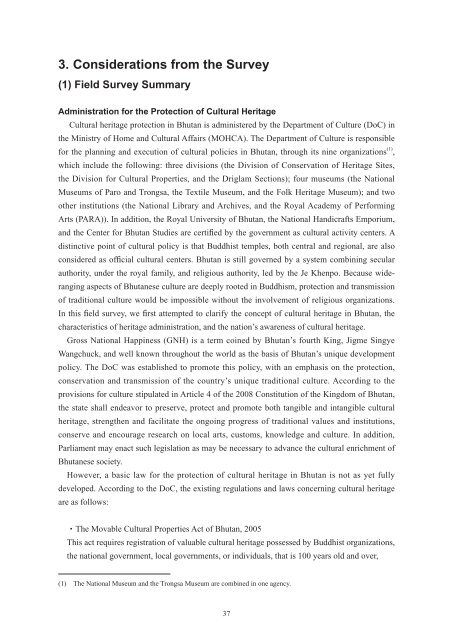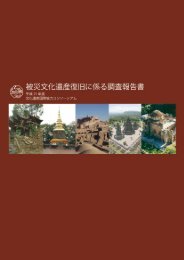English - JCIC-Heritage
English - JCIC-Heritage
English - JCIC-Heritage
You also want an ePaper? Increase the reach of your titles
YUMPU automatically turns print PDFs into web optimized ePapers that Google loves.
3. Considerations from the Survey<br />
(1) Field Survey Summary<br />
Administration for the Protection of Cultural <strong>Heritage</strong><br />
Cultural heritage protection in Bhutan is administered by the Department of Culture (DoC) in<br />
the Ministry of Home and Cultural Affairs (MOHCA). The Department of Culture is responsible<br />
for the planning and execution of cultural policies in Bhutan, through its nine organizations (1) ,<br />
which include the following: three divisions (the Division of Conservation of <strong>Heritage</strong> Sites,<br />
the Division for Cultural Properties, and the Driglam Sections); four museums (the National<br />
Museums of Paro and Trongsa, the Textile Museum, and the Folk <strong>Heritage</strong> Museum); and two<br />
other institutions (the National Library and Archives, and the Royal Academy of Performing<br />
Arts (PARA)). In addition, the Royal University of Bhutan, the National Handicrafts Emporium,<br />
and the Center for Bhutan Studies are certified by the government as cultural activity centers. A<br />
distinctive point of cultural policy is that Buddhist temples, both central and regional, are also<br />
considered as official cultural centers. Bhutan is still governed by a system combining secular<br />
authority, under the royal family, and religious authority, led by the Je Khenpo. Because wideranging<br />
aspects of Bhutanese culture are deeply rooted in Buddhism, protection and transmission<br />
of traditional culture would be impossible without the involvement of religious organizations.<br />
In this field survey, we first attempted to clarify the concept of cultural heritage in Bhutan, the<br />
characteristics of heritage administration, and the nation’s awareness of cultural heritage.<br />
Gross National Happiness (GNH) is a term coined by Bhutan’s fourth King, Jigme Singye<br />
Wangchuck, and well known throughout the world as the basis of Bhutan’s unique development<br />
policy. The DoC was established to promote this policy, with an emphasis on the protection,<br />
conservation and transmission of the country’s unique traditional culture. According to the<br />
provisions for culture stipulated in Article 4 of the 2008 Constitution of the Kingdom of Bhutan,<br />
the state shall endeavor to preserve, protect and promote both tangible and intangible cultural<br />
heritage, strengthen and facilitate the ongoing progress of traditional values and institutions,<br />
conserve and encourage research on local arts, customs, knowledge and culture. In addition,<br />
Parliament may enact such legislation as may be necessary to advance the cultural enrichment of<br />
Bhutanese society.<br />
However, a basic law for the protection of cultural heritage in Bhutan is not as yet fully<br />
developed. According to the DoC, the existing regulations and laws concerning cultural heritage<br />
are as follows:<br />
The Movable Cultural Properties Act of Bhutan, 2005<br />
This act requires registration of valuable cultural heritage possessed by Buddhist organizations,<br />
the national government, local governments, or individuals, that is 100 years old and over, <br />
(1) The National Museum and the Trongsa Museum are combined in one agency.<br />
37




